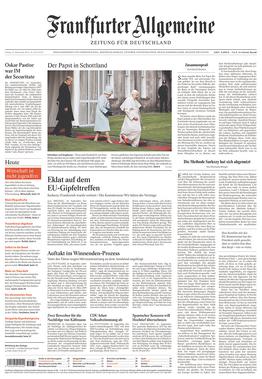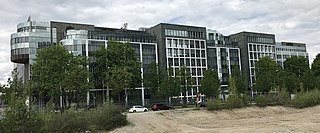
Operation Bernhard was an exercise by Nazi Germany to forge British bank notes. The initial plan was to drop the notes over Britain to bring about a collapse of the British economy during the Second World War. The first phase was run from early 1940 by the Sicherheitsdienst (SD) under the title Unternehmen Andreas. The unit successfully duplicated the rag paper used by the British, produced near-identical engraving blocks and deduced the algorithm used to create the alpha-numeric serial code on each note. The unit closed in early 1942 after its head, Alfred Naujocks, fell out of favour with his superior officer, Reinhard Heydrich.

The Frankfurter Allgemeine Zeitung is a German newspaper founded in 1949. It is published daily in Frankfurt and is considered a newspaper of record for Germany. Its Sunday edition is the Frankfurter Allgemeine Sonntagszeitung.
Orell Füssli is a Swiss banknotes printing and bookselling company, established by Christoph Froschauer in 1519 as a book printer and publisher. It is currently operating in many print-related segments, such as security printing, bookselling and publishing, with security printing being a primary contemporary product of company. Company's shares are traded on SIX Swiss Exchange since 1897. It is the oldest continuously publicly traded company of Switzerland.

The Lithuanian litas (ISO currency code LTL, symbolized as Lt; plural litai or litų was the currency of Lithuania, until 1 January 2015, when it was replaced by the euro. It was divided into 100 centų. The litas was first introduced on 2 October 1922 after World War I, when Lithuania declared independence, and was reintroduced on 25 June 1993 following a period of currency exchange from the Soviet ruble to the litas with the temporary talonas then in place. The name was modeled after the name of the country. From 1994 to 2002, the litas was pegged to the U.S. dollar at the rate of 4 to 1. The litas was pegged to the euro at the rate of 3.4528 to 1 since 2002. The euro was expected to replace the litas by 1 January 2007, but persistent high inflation and the economic crisis delayed the switch.

Security printing is the field of the printing industry that deals with the printing of items such as banknotes, cheques, passports, tamper-evident labels, security tapes, product authentication, stock certificates, postage stamps, and identity cards. The main goal of security printing is to prevent forgery, tampering, or counterfeiting. More recently many of the techniques used to protect these high-value documents have become more available to commercial printers, whether they are using the more traditional offset and flexographic presses or the newer digital platforms. Businesses are protecting their lesser-value documents such as transcripts, coupons and prescription pads by incorporating some of the features listed below to ensure that they cannot be forged or that alteration of the data cannot occur undetected.

A superdollar is a very high quality counterfeit United States one hundred-dollar bill, alleged by the U.S. government to have been made by unknown organizations or governments. In 2011, government sources stated that these counterfeit bills were in "worldwide circulation" from the late 1980s until at least July 2000 in an extradition court case.

The Neue Zürcher Zeitung is a Swiss, German-language daily newspaper, published by NZZ Mediengruppe in Zürich. The paper was founded in 1780. It has a reputation as a high-quality newspaper, as the Swiss-German newspaper of record, and for detailed reports on international affairs.

Bruno S. Frey is a Swiss economist and visiting professor for Political Economy at the University of Basel. Frey's research topics include Political economy and Happiness economics, with his published work including concepts derived from Psychology, Sociology, Jurisprudence, History, Arts, and Theology.

Klaus Martin Schwab is a German mechanical engineer, economist, and founder of the World Economic Forum (WEF). He has acted as the WEF's chairman since founding the organisation in 1971. In May 2024, WEF announced that Schwab will move from his role as Executive Chairman to chairman of the Board of Trustees by January 2025. No successor has been named yet.

Counterfeit money is currency produced outside of the legal sanction of a state or government, usually in a deliberate attempt to imitate that currency and so as to deceive its recipient. Producing or using counterfeit money is a form of fraud or forgery, and is illegal in all jurisdictions of the world. The business of counterfeiting money is nearly as old as money itself: plated copies have been found of Lydian coins, which are thought to be among the first Western coins. Before the introduction of paper money, the most prevalent method of counterfeiting involved mixing base metals with pure gold or silver. Another form of counterfeiting is the production of documents by legitimate printers in response to fraudulent instructions. During World War II, the Nazis forged British pounds and American dollars. Today, some of the finest counterfeit banknotes are called Superdollars because of their high quality and imitation of the real US dollar. There has been significant counterfeiting of Euro banknotes and coins since the launch of the currency in 2002, but considerably less than that of the US dollar.

Koenig & Bauer AG is a German company that makes printing presses based in Würzburg. It was founded by Friedrich Koenig and Andreas Friedrich Bauer in Würzburg in 1817, making it the oldest printing press manufacturer in the world still in service.
Ringier AG is a media group operating in multiple countries with over 6,500 employees. Founded in 1833, the family-owned business manages media brands across print and digital, TV and radio, and is active in the entertainment and digital marketplace sectors. The headquarters of Ringier AG is located in Zofingen, Aargau, with additional offices in Zurich and Lausanne.

Giesecke+Devrient is a German company headquartered in Munich that provides banknote and securities printing, smart cards, and cash handling systems.

Banknotes of the euro, the common currency of the eurozone, have been in circulation since the first series was issued in 2002. They are issued by the national central banks of the Eurosystem or the European Central Bank. The euro was established in 1999, but "for the first three years it was an invisible currency, used for accounting purposes only, e.g. in electronic payments". In 2002, notes and coins began to circulate. The euro rapidly took over from the former national currencies and slowly expanded around the European Union.
Werner F.M. De Bondt is one of the founders in the field of behavioral finance. He is also the founding director of Richard H. Driehaus Center for Behavioral Finance at DePaul University in Chicago. Previously, he was the Frank Graner Professor of Investment Management at the University of Wisconsin-Madison, and the Thomas F. Gleed Chair of Business Administration at Albers School of Business and Economics at the Seattle University.
Fidelity Printers and Refiners (FPR) is a Zimbabwean security printing and gold refinery company wholly owned by the Reserve Bank of Zimbabwe. The company was established in 1966. FPR operates from a printing and gold refinery plant located in Msasa Industrial area in Harare and a coin minting facility in Bulawayo.

Martin Dahinden is a Swiss diplomat who has served as ambassador of Switzerland to the United States of America from 2014 to 2019. Dahinden presented his credentials to the President of the United States of America, Barack Obama, on November 18, 2014 at the White House in Washington, D.C. He retired in 2019.
George Geza Szpiro is an Israeli–Swiss author, journalist, and mathematician. He has written articles and books on popular mathematics and related topics.

Gualtiero "Rino" Giori (1913–1992) was an Italian security printer and inventor who founded the company Giori SA in 1951.
Banknote processing is an automated process to check the security features and the fitness of banknotes in circulation, to count and sort them by denomination and to balance deposits. This processing of currency is performed by security printing companies, central banks, financial institutions and cash-in-transit (CiT) companies.












